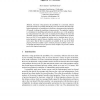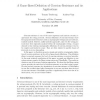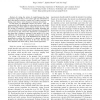33 search results - page 3 / 7 » Knowledge-based modelling of voting protocols |
WOTE
2010
13 years 2 months ago
2010
Abstract. While electronic elections promise the possibility of convenient, efficient and secure facilities for recording and tallying votes, recent studies have highlighted inadeq...
ESOP
2005
Springer
13 years 10 months ago
2005
Springer
Electronic voting promises the possibility of a convenient, efficient and secure facility for recording and tallying votes in an election. Recently highlighted inadequacies of imp...
ALDT
2011
Springer
12 years 4 months ago
2011
Springer
A variety of preference aggregation schemes and voting rules have been developed in social choice to support group decision making. However, the requirement that participants provi...
CSFW
2010
IEEE
13 years 8 months ago
2010
IEEE
Coercion-resistance is one of the most important and intricate security requirements for voting protocols. Several definitions of coercion-resistance have posed in the literature,...
IEEEARES
2009
IEEE
13 years 11 months ago
2009
IEEE
—In voting, the notion of receipt-freeness has been proposed to express that a voter cannot gain any information to prove that she has voted in a certain way. It aims to prevent ...



